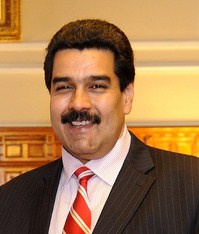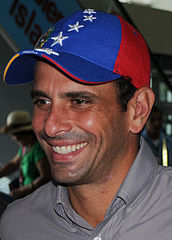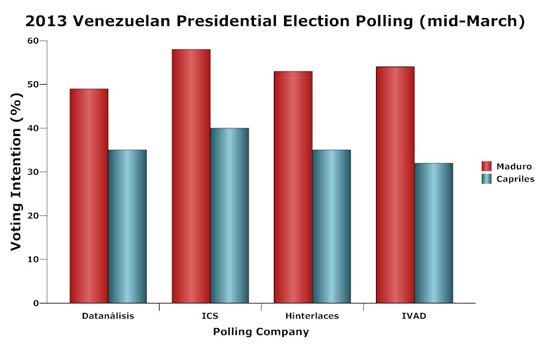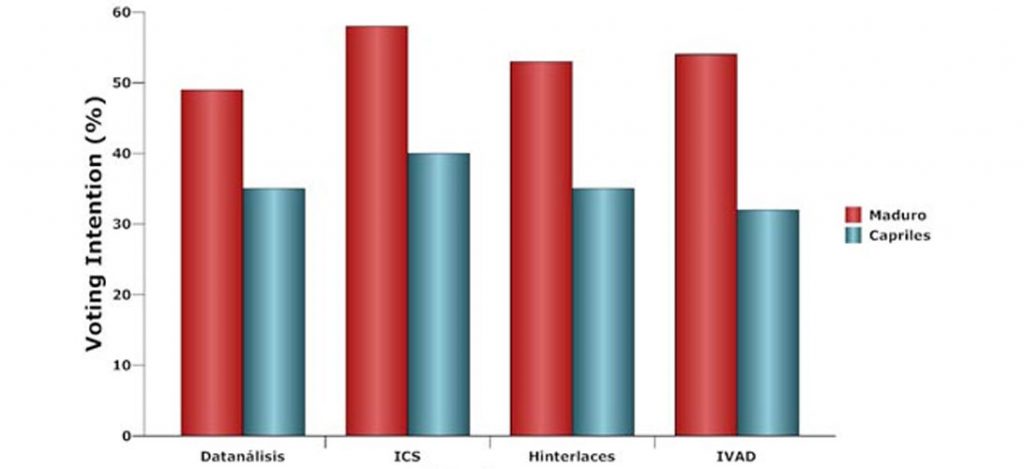Venezuelan presidential election 2013: it’s Chávez deputy Nicolás Maduro at a canter!
Originally published by Huffington Post
The temporary ceasefire following Hugo Chávez’s death is over, and campaigning for mid-April elections has seen Venezuela’s two political poles renew hostilities. Here we take a local look at who’s heading the race for the presidential palace and why.
The Storm After the Calm Before the Other Storm
For us Venezuela-watchers, lulls in political mudslinging are eerie, disconcerting calms before inevitable storms; the question is less “will craziness ensue?” and more “what kind of craziness will it be this time?”
The good news is that nowadays the craziness is more verbal knockabout than violent destabilisation. The ruling PSUV knows it can win and win comfortably, so there’s no need to be provoked. The opposition MUD knows it can’t beat Chávez and Co. with its democracy stick and then stage another bungling coup d’état. So both settle, to their credit, for the rhetorical equivalent of cage fighting.
Low Blows All Round
Sadly for opposition candidate Henrique Capriles, his campaign began with a low blow in full view of the referee. His suggestion that a long-dead Chávez had been kept on ice for political purposes was devoured by the MUD’s despairing right wing, but to everyone else it was unsavoury and unsporting.
Stand-in president Nicolás Maduro (PSUV) hit back with a golpe bajo of his own, appearing to revive rumours about the sexuality of his single, 40-year-old rival. Since Venezuelan culture is not only hyper-sexualised but hyper-heterosexualised – Chávez once told his wife live on TV that she would “get hers” once he got home – he won’t be condemned for this, but it is totally at odds with his party’s stance on LGBT issues and could anger supporters.
Maduro: New Improved Chávez!

Overall, Maduro has quite sensibly portrayed himself as the new standard-bearer of Chavismo, reinforcing at every opportunity his links to the instant legend of his predecessor. He is even making the right noises on Chávez weak points like corruption and service delivery.
A new foreign-exchange allocation system aims to prevent the resource-sapping currency arbitrage that has long been a money-spinner for those rich enough to participate. And a new overarching body is tasked with coordinating popular social-welfare “missions” whose planning and accountability have been deficient. Whether or not these institutions work in the long term, they meet two key perceived needs in the short term.
Stylistically, Maduro has emphasised precisely the humble past for which he was ridiculed by the opposition, turning up for rallies at the wheel of the same bus he used to drive before entering politics. This appears to be paying dividends. In Venezuela celebrities usually go to great lengths to avoid its toxic politics – genuine headline: “Ricky Martin denies being a socialist” – but Maduro has even received public backing from a raft of soap stars and singers.
Capriles: It’s the Election Process, Stupid!

Capriles has looked to disassociate Maduro from Chávez, underlining the fact that people elected Chávez not Maduro and dismissing Maduro as so lightweight that “I don’t even ignore him”. Unlike the foreign media, all het up about the clash of ideologies, Capriles knows that for Venezuelan voters this is also about who can solve everyday problems like blackouts and crime. Beyond these issues, however, things are simply not going all that badly, and he has had to turn on the electoral process itself.
Many will rightly point to Jimmy Carter’s assertion that Venezuela’s “election process is the best in the world”, though “process” is often misconstrued to include wider fairness issues (use of public resources for campaigning, civil liberties, freedom of the press etc.) But this horse is as dead now as it was all the other times the opposition whipped it, and it could betheir own fomenting of baseless mistrust that draws criticism from international observers (as it has in the past).
Poll Dancing to Victory
Polling, like everything else in Venezuela, is tainted by political polarisation, but on one thing everyone agrees: Maduro is miles ahead.

Datanálisis, whose president openly favours the opposition, puts Maduro 14 points ahead (49-35); ICS says 18 (58-40); Hinterlaces agrees (53-35), and IVAD makes it a stonking 22 (54-32). That’s an average lead of 18 points in favour of Maduro. Polls are sometimes wrong, but rarely by so much.
Worse, polls can be self-reinforcing. Datanálisis also asked who would win: 65% plumped for Maduro and just 15% for Capriles. This could easily deactivate opposition activists, though they should remember that Chavistas have previous when it comes to not showing up to rubber-stamp dead certs.
Could the Wheels Come Off the Maduromobile?
In short, no. At worst maybe one of four, but then there’ll be plenty of burly supporters on hand to carry him, bus ‘n’ all, over the line. If he has anything to worry about, it’s practical issues like food shortages and electricity rationing in Zulia state, not the threat from Capriles. I hate to say I told you so, but this election is his to lose.
From the opposition perspective, recent comments from Hinterlaces pollster Oscar Schemel were unusually insightful on the appeal of Chávez, Chavismo, and Maduro: “It’s not enough to present a discourse offering food and employment; people want dignity.” Until Capriles and the MUD truly understand and empathise with PSUV supporters – which ain’t gonna happen in three weeks – there can be only one winner.
Image attributions:
1) “Nicolás Maduro, canciller venezolano, en el Congreso de Perú” by Congreso de la República del Perú via Wikimedia (Creative Commons licence)
2) “Henrique Capriles Radonski, candidate for President of Venezuela. In Santiago Mariño Internecional Airport on the Margarita island, Venezuela” by Wilfredor via Wikimedia (Creative Commons licence)
3) “Venezuelan President Election Polling 2013 mid-March”, © 2013 Asa K Cusack.


